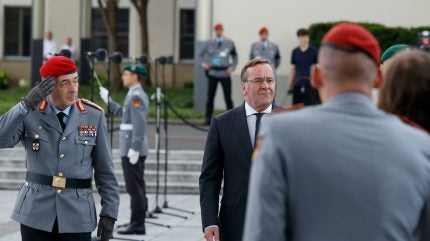
Germany’s Defense Minister Boris Pistorius has announced sweeping changes to the Bundeswehr, reflecting the imperative to modernise and adapt to contemporary security threats.
The restructuring, informed by the “Bundeswehr Structure” project group’s findings, marks a departure from the existing framework, signalling a shift towards enhancing deterrence, defence, and war capabilities.
At the heart of the overhaul is establishing four branches of the armed forces, alongside operational and support commands tailored to defence scenarios. The decision to reorganise comes amid growing concerns over Russia’s destabilising actions, prompting the need for a more agile and prepared military force within Germany and its allied networks.
Germany has committed significant materiel support to Ukraine since the invasion of Russian Forces in February 2022. Recently, Germany and Poland have taken the lead on an Armoured Capability Coalition for Ukraine, with the UK, Sweden, and Italy expressing interest in participating.
Central to the revamped structure is the elevation of cyber and information space as the fourth branch of the armed forces, reflecting the evolving nature of modern warfare. The recognition of cyberspace as a critical domain for military operations, encompasses hybrid threat analysis and electronic warfare capabilities.
Furthermore, integrating homeland security forces into the army sees a realignment to optimise alliance and defence operations readiness. Simultaneously, measures such as establishing a Continuing Airworthiness Management Organisation demonstrate a commitment to ensuring the technical integrity of military assets.
The restructuring also emphasises the importance of relieving troops of non-essential tasks, enabling a sharper focus on core defence functions. By streamlining administrative processes and enhancing collaboration between the armed forces and military administration, the Bundeswehr aims to achieve greater operational efficiency and preparedness.
Crucially, the reforms seek to clarify roles and responsibilities within operational management, reducing bureaucratic hurdles and accelerating decision-making processes. Emphasising a decentralised approach, the restructuring aims to empower lower tactical levels while upholding the principle of warworthiness outlined in defence policy guidelines.
Germany has taken proactive steps to bolster its defence capabilities through three contracts. Firstly, a $1.2bn deal with RTX subsidiary Raytheon enhances air defence by acquiring Patriot systems.
Secondly, Rheinmetall secured a €2.7bn ($1.1bn) contract to supply 123 Schwerer Waffenträger Infanterie vehicles. Lastly, Airbus clinched an order for 62 H145M helicopters, the largest ever, including options for 20 more, enhancing the German Armed Forces’ operational versatility.





